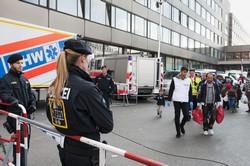Better relations between state authorities and ethnic minorities
Researchers on the EU-funded COREPOL (Conflict resolution, mediation and restorative justice and the policing of ethnic minorities in Germany, Austria, and Hungary) project aimed to advance improved conflict solving mechanisms for both state authorities and minorities. Initial work consisted of literature reviews of informal conflict resolution and a series of expert interviews. This revealed that programmes of informal conflict resolution usually function on a trial-and-error basis but that there is the intention to improve police-minority relations. In the field study phase, the focus was on the experiences of minorities and their representatives, as well as on practical policing. Discriminatory ethnic profiling and its prevention constituted a critical area of project research. The issue was addressed in depth at one of the COREPOL field study sites where issues of ethnic profiling through police stops are of concern to police authorities. Project work focused on Germany, Hungary and Austria. A common denominator was found in these three countries with regard to the basic structure of police-citizen relations. The management of complaints relating to police behaviour, even when it involved citizens of mainstream society, is not yet as established in Europe as in the English-speaking world. Other areas of interest have to do with migrants' living conditions and how they relate to problems with state authorities. These were explored in German Turkish/Arab neighbourhoods, the Hungarian Roma and the Austrian research group of sub-Saharan Africans. It became clear that conflict solving mechanisms exist, but are in need of improvement. This can help establish a different consciousness on both sides and strengthen democratic and community-oriented police practices in areas where minorities reside. To further the impact of its work, COREPOL initiated contact with community initiatives and established mutual interest and communication channels. Expected final results target, among others, improvements in police training and education institutions and support for organisations working in integration and conflict solving. Over the long-term, project results should positively impact minorities' experiences of conflict with state authorities. Progressive changes on both sides can increase trust and ultimately encourage greater involvement in educational or labour market initiatives. As such, an enhanced sense of empowerment and of legitimacy bode well for individual Member States and Europe as a whole.







